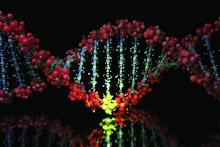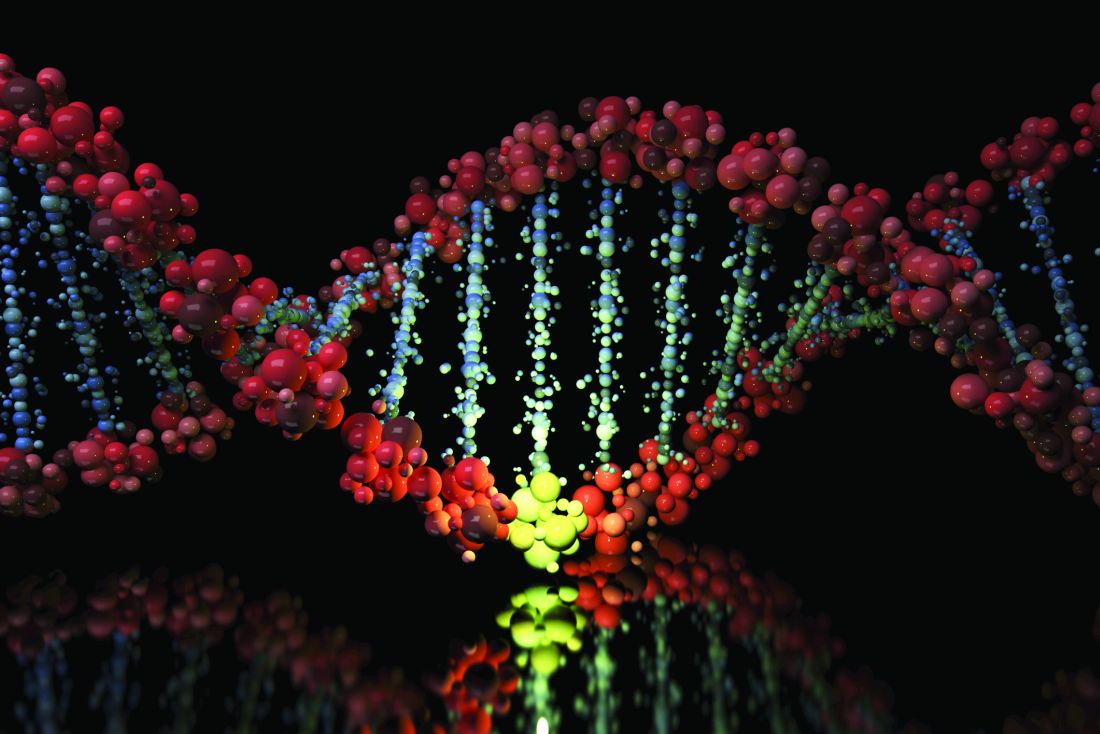User login
The presence of both TP53 gene mutation and complex karyotype may signal a dismal prognosis in patients with mantle cell lymphoma (MCL), according to results of a study.
All patients who had TP53 mutations and complex karyotype died within 1.2 years of diagnosis, while almost all patients with neither predictor were still alive at 2 years, according to study data reported in the journal Clinical Lymphoma, Myeloma & Leukemia.
By combining the markers, patients could be stratified into three prognostic groups that had distinct outcomes, regardless of treatment regimen, reported the study’s corresponding author Vít Procházka, MD, PhD, of the department of hemato-oncology faculty of medicine and dentistry at Palacký University, Olomouc, Czech Republic, and his coauthors.
“Our findings support a need to perform both tests, molecular cytogenetics, and next-generation sequencing simultaneously before initiation of treatment for MCL,” Dr. Procházka and his coauthors wrote.
In current clinical practice, TP53 mutational status and molecular cytogenetics are not routinely assessed prior to treatment initiation, they noted in their report.
The study, believed to be the first to evaluate the combined prognostic role of TP53 mutation and complex karyotype in an MCL cohort, included 74 consecutive adult patients newly diagnosed with MCL during 2000-2014. Seventy-three patients were treated with a rituximab-containing regimen. One patient, who did not have TP53 mutation or complex karyotype, was under observation without therapy.
Complex karyotype was found in 13 patients for whom fixed cells were available to perform cytogenetic analysis, the authors reported, while TP53 mutations were seen in 15 patients who were evaluated for that marker.
Altogether, 48 patients (64.9%) had biological material available to perform both analyses. Of those, 4 patients were found to have both TP53 mutation and complex karyotype, 12 had one of those two markers, and 32 had neither.
While patients with both markers all died within 1.2 years, 2-year overall survival was 50.0% for those with one marker and 93.8% for those with neither marker; those differences were significant between groups (P less than .001), according to investigators.
Progression-free survival analyses showed similar results, with significant differences between the three groups, investigators reported.
Multivariate analysis showed that both TP53 mutation and complex karyotype were predictors of inferior progression-free survival and overall survival, independent of age and scores on the MCL International Prognostic Index (MIPI).
While larger studies are needed to confirm the results, investigators suggested that novel treatment approaches might be warranted for patients in the highest-risk subgroup.
“The patients harboring the negative prognostic markers [TP53 mutation] and [complex karyotype] might be indicated for a novel induction treatment strategy probably in combination with maintenance therapy different from rituximab,” they said.
The study was supported by grants from the Czech Ministry of Health and Palacký University. The researchers reported having no conflicts of interest.
SOURCE: Obr A et al. Clin Lymphoma Myeloma Leuk. 2018 Aug 23. doi: 10.1016/j.clml.2018.07.282.
The presence of both TP53 gene mutation and complex karyotype may signal a dismal prognosis in patients with mantle cell lymphoma (MCL), according to results of a study.
All patients who had TP53 mutations and complex karyotype died within 1.2 years of diagnosis, while almost all patients with neither predictor were still alive at 2 years, according to study data reported in the journal Clinical Lymphoma, Myeloma & Leukemia.
By combining the markers, patients could be stratified into three prognostic groups that had distinct outcomes, regardless of treatment regimen, reported the study’s corresponding author Vít Procházka, MD, PhD, of the department of hemato-oncology faculty of medicine and dentistry at Palacký University, Olomouc, Czech Republic, and his coauthors.
“Our findings support a need to perform both tests, molecular cytogenetics, and next-generation sequencing simultaneously before initiation of treatment for MCL,” Dr. Procházka and his coauthors wrote.
In current clinical practice, TP53 mutational status and molecular cytogenetics are not routinely assessed prior to treatment initiation, they noted in their report.
The study, believed to be the first to evaluate the combined prognostic role of TP53 mutation and complex karyotype in an MCL cohort, included 74 consecutive adult patients newly diagnosed with MCL during 2000-2014. Seventy-three patients were treated with a rituximab-containing regimen. One patient, who did not have TP53 mutation or complex karyotype, was under observation without therapy.
Complex karyotype was found in 13 patients for whom fixed cells were available to perform cytogenetic analysis, the authors reported, while TP53 mutations were seen in 15 patients who were evaluated for that marker.
Altogether, 48 patients (64.9%) had biological material available to perform both analyses. Of those, 4 patients were found to have both TP53 mutation and complex karyotype, 12 had one of those two markers, and 32 had neither.
While patients with both markers all died within 1.2 years, 2-year overall survival was 50.0% for those with one marker and 93.8% for those with neither marker; those differences were significant between groups (P less than .001), according to investigators.
Progression-free survival analyses showed similar results, with significant differences between the three groups, investigators reported.
Multivariate analysis showed that both TP53 mutation and complex karyotype were predictors of inferior progression-free survival and overall survival, independent of age and scores on the MCL International Prognostic Index (MIPI).
While larger studies are needed to confirm the results, investigators suggested that novel treatment approaches might be warranted for patients in the highest-risk subgroup.
“The patients harboring the negative prognostic markers [TP53 mutation] and [complex karyotype] might be indicated for a novel induction treatment strategy probably in combination with maintenance therapy different from rituximab,” they said.
The study was supported by grants from the Czech Ministry of Health and Palacký University. The researchers reported having no conflicts of interest.
SOURCE: Obr A et al. Clin Lymphoma Myeloma Leuk. 2018 Aug 23. doi: 10.1016/j.clml.2018.07.282.
The presence of both TP53 gene mutation and complex karyotype may signal a dismal prognosis in patients with mantle cell lymphoma (MCL), according to results of a study.
All patients who had TP53 mutations and complex karyotype died within 1.2 years of diagnosis, while almost all patients with neither predictor were still alive at 2 years, according to study data reported in the journal Clinical Lymphoma, Myeloma & Leukemia.
By combining the markers, patients could be stratified into three prognostic groups that had distinct outcomes, regardless of treatment regimen, reported the study’s corresponding author Vít Procházka, MD, PhD, of the department of hemato-oncology faculty of medicine and dentistry at Palacký University, Olomouc, Czech Republic, and his coauthors.
“Our findings support a need to perform both tests, molecular cytogenetics, and next-generation sequencing simultaneously before initiation of treatment for MCL,” Dr. Procházka and his coauthors wrote.
In current clinical practice, TP53 mutational status and molecular cytogenetics are not routinely assessed prior to treatment initiation, they noted in their report.
The study, believed to be the first to evaluate the combined prognostic role of TP53 mutation and complex karyotype in an MCL cohort, included 74 consecutive adult patients newly diagnosed with MCL during 2000-2014. Seventy-three patients were treated with a rituximab-containing regimen. One patient, who did not have TP53 mutation or complex karyotype, was under observation without therapy.
Complex karyotype was found in 13 patients for whom fixed cells were available to perform cytogenetic analysis, the authors reported, while TP53 mutations were seen in 15 patients who were evaluated for that marker.
Altogether, 48 patients (64.9%) had biological material available to perform both analyses. Of those, 4 patients were found to have both TP53 mutation and complex karyotype, 12 had one of those two markers, and 32 had neither.
While patients with both markers all died within 1.2 years, 2-year overall survival was 50.0% for those with one marker and 93.8% for those with neither marker; those differences were significant between groups (P less than .001), according to investigators.
Progression-free survival analyses showed similar results, with significant differences between the three groups, investigators reported.
Multivariate analysis showed that both TP53 mutation and complex karyotype were predictors of inferior progression-free survival and overall survival, independent of age and scores on the MCL International Prognostic Index (MIPI).
While larger studies are needed to confirm the results, investigators suggested that novel treatment approaches might be warranted for patients in the highest-risk subgroup.
“The patients harboring the negative prognostic markers [TP53 mutation] and [complex karyotype] might be indicated for a novel induction treatment strategy probably in combination with maintenance therapy different from rituximab,” they said.
The study was supported by grants from the Czech Ministry of Health and Palacký University. The researchers reported having no conflicts of interest.
SOURCE: Obr A et al. Clin Lymphoma Myeloma Leuk. 2018 Aug 23. doi: 10.1016/j.clml.2018.07.282.
FROM CLINICAL LYMPHOMA, MYELOMA & LEUKEMIA
Key clinical point:
Major finding: Patients with both markers all died within 1.2 years, while 2-year overall survival was 50.0% for those with one marker and 93.8% for those with neither marker (P less than .001).
Study details: A study of 74 consecutive adult patients newly diagnosed with MCL during 2000-2014.
Disclosures: The study was supported by grants from the Czech Ministry of Health and Palacký University, Olomouc, Czech Republic. Study authors reported having no conflicts of interest.
Source: Obr A et al. Clin Lymphoma Myeloma Leuk. 2018 Aug 23. doi: 10.1016/j.clml.2018.07.282.

